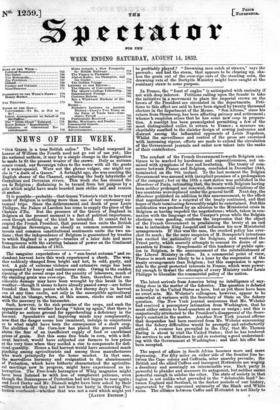The conduct of the French Government towards Belgium con- tinues
to be marked by harshness and superciliousness, not un- mixed with symptoms of fear and hesitation. The treaty of com- merce between France and Belgium, concluded in December 1845, terminated on the 9th instant. To the last moment the Belgian Government was amused with inexplicit promises of a prolongation of the compact ; but on the 10th a curt notice was published in the /Ifoniteurof Paris, intimating that, the treaty with Belgium having been neither prolonged nor renewed, the commercial relations of the two countries were replaced under the general tariff. Next day, the Moniteur published an addition to this announcement, to the effect that negotiations for a renewal of the treaty continued, and that hopes of their terminating favourably might be entertained. But this notification was prefaced by an allusion to the Ministerial crisis in Belgium as having impeded the negotiations; which, taken in con- nexion with the language of the Usurper's press while the Belgian elections were pending, confirms the impression that the object of the French Government in proclaiming the treaty at an end was to intimidate King Leopold and influence his new Ministerial arrangements. If this was the case, the crooked policy has over- shot its mark ; for the mere suspicion of M. Bonaparte's intentions has excited the nationality of the Belgians, and weakened the Priest party, which scarcely attempts to conceal its desire of an- nexation to France. Symptomatic of this tendency of public opin- ion in Belgium, is the announcement of the reestablishment of the Liberal Ministry in office. In a commercial point of view, France is much more likely to be a loser by the suspension of the treaty arrangements than Belgium ; but this suspension is agree- able to the great protected interests in France, which were power- ful enough to thwart the attempts of every Ministry under Louis Philippe to liberalize the commercial polity of the nation.


























